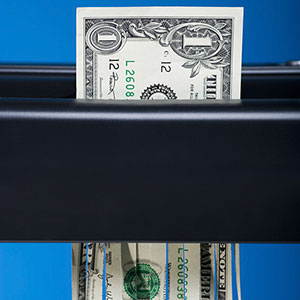New proposal would kill the dollar bill
A bipartisan group of senators wants to replace the paper currency with a coin to save money.
By Kim Peterson 1 hour ago
 Americans hate dollar coins, and they've made their feelings clear. But that isn't stopping a group of senators from pushing to replace the paper dollar with a coin.
Americans hate dollar coins, and they've made their feelings clear. But that isn't stopping a group of senators from pushing to replace the paper dollar with a coin.The bipartisan group -- which includes such heavyweights as John McCain, R-Ariz., and Tom Harkin, D-Iowa -- has a pretty good reason to like the coin, as it would save the country a bunch of money. Last year, the Government Accountability Office said scrapping the bill for a coin would save $146 million a year.
Dollar coins cost more to make but last decades, while a paper dollar has an average lifespan of 21 months.
Other countries have figured this out and seem to have no problem with a coin of comparable denomination. But Americans' distaste led to suspended production of the Sacagawea dollar coin, which had been criticized for looking like play money and being too similar in size and heft to the quarter.
So how could a new dollar coin succeed where Sacagawea, Susan B. Anthony and the wildly unpopular presidential dollar coins could not? It's very simple: All you have to do is get rid of the paper dollar. The senators' bill, filed Thursday, would stop the printing of $1 bills within four years.
"The key, the absolute key to making this work, is phasing out the paper dollar," former Rep. Jim Kolbe, now a co-chairman of the Dollar Coin Alliance group lobbying for the coin, told Bloomberg.
The group has one thing in its favor: When people hear about how much money the government saves, they're more likely to support dollar coins.
But killing off the paper dollar -- the item so lovingly framed on the walls of mom-and-pop restaurants, the currency so easily used in allowance payments, tip jars and charity donations -- is going to be a very tough sell no matter what the financial benefits may be.
More on moneyNOW1
No comments:
Post a Comment